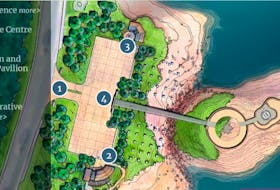Environmental and natural resource-related problems seem to be causing environmental, social, and economic challenges everywhere these days.
Why did the Muskrat Falls hydroelectric project become so controversial and what should the provincial government do to prevent major energy policy problems in the future?
How can the federal government decide how to allocate fish quotas amongst competing fishing fleets and groups in a sustainable and fair way?
What do caribou hunting bans mean for the food security of Indigenous people in Labrador and Nunatsiavut?
How will climate change affect your day-to-day life and how are governments responding to climate change challenges that will affect us all?
These are the kinds of problems that attract students from around the world to the master of arts in environmental policy program, the first graduate-level program ever developed at Grenfell Campus. Launched in 2012 and now in its sixth year, the program has welcomed over 70 students to the program from more than a dozen countries. While there is no easy answer to many of the complex environmental policy problems facing our communities, one thing is clear: we need more people working on the problems who have knowledge and skills that can improve the capacity of governments, the private sector, and communities to understand and address environmental problems in a sustainable and fair way. The master of arts in environmental policy program is designed to foster such critical thinkers, analysts and problem solvers, including through learning experiences that take students out of the classroom and into the actual challenges facing our communities.
How does the program achieve this? In addition to acquiring analytical and problem-solving skills during course work and refining those skills by carrying out an independent research project, students in the program apply and develop their knowledge through a 12-week internship with a government office, business, or community group. These internships expose students to the challenges faced by practitioners and communities and provide students with valuable work experience attractive to employers. To date, the program has administered over 60 internships internationally, nationally and locally. While one of our students is currently completing his internship in Bangladesh, most students secure internships at federal and provincial government departments here in Canada. Right now we have students completing internships throughout the country with Parks Canada, Fisheries and Oceans Canada, and Natural Resources Canada. Provincially, environmental policy interns are completing placements with the department of Fisheries and Land Resources. In the Western region of the province our students have internships with a variety of public, private and non-profit organizations such as the Western Environment Centre, the Corner Brook Port Corporation, and the Town of Deer Lake. To learn more about the master of arts in environmental policy program, visit http://grenfell-epi.com/masters-in-environmental-policy/about-maep/
Stephen Decker is a lecturer in environmental studies and geography and is the graduate officer, masters of arts in environmental policy at Grenfell Campus.









